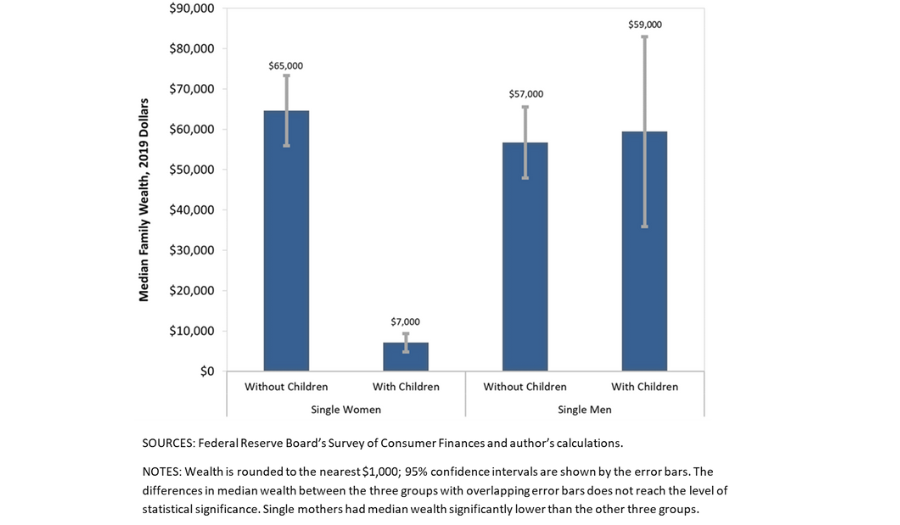Working Moms Can Benefit Families, the Economy

Why Supporting Working Moms Can Benefit Families, the Economy, and All of Us
By Ana Hernández Kent • July 13, 2022
As a researcher who’s studied economic and wealth disparities for years, I see regular data on how mothers aren’t fully and fairly included in the economy. As a mom myself, I take a special interest in the data. Even prior to the pandemic, mothers earned less than fathers—by some estimates, only 75 cents for every dollar (PDF) fathers were paid—and had considerably less wealth. Moms were overrepresented in low-wage jobs and had less access to workplace benefits that help build wealth.
Yet, if mothers were equitably included in the economy, we could all benefit. The U.S. might be more competitive internationally and have a larger economy, more vibrant businesses and thriving families. Research shows us ways to get there: by expanding benefits and flexibility in the workplace; improving access to quality, affordable child care; and encouraging a cultural shift toward appropriately valuing “women’s” contributions, both paid and unpaid, among other ideas.
The Pandemic Recession Disproportionately Affected Moms
The COVID-19 recession reinforced many of the barriers mothers face and was truly a “mom-cession” in that mothers disproportionately faced setbacks. A larger share of mothers than fathers found themselves out of their jobs, and many mothers were out of the labor force entirely. This matters, because more and more American families rely on mothers’ wages, despite moms being paid less than dads. This gap means that moms must make fewer dollars stretch further, a problem made even more acute by rising prices of groceries, gas and other essentials.
Compounding these struggles, mothers—particularly single mothers—often have extremely low levels of wealth. Research shows that single moms suffer a “motherhood wealth penalty,” having just $7,000 in median wealth compared with more than nine times that amount for single women without children. (Single fathers, by the way, do not experience a commensurate “fatherhood penalty”—in wages or in wealth.) That extra $58,000 means greater financial security, like ensuring that trip to the ER for a broken arm doesn’t plunge the family into debt.
Taken together, this means that after the COVID-19 recession hit, not only were moms more likely to be out of a job, they also had fewer resources with which to withstand the income loss.
Why We Should Care about How Well Mothers Do
Some readers who are not parents or whose children have grown may wonder, “Why should I care?” I’m glad you asked. Research shows supporting mothers is good for the economy, businesses and families.
Economic expansion
First, the broader economy could expand through higher labor force participation if mothers were better supported. More mothers in the workforce means tax revenue would potentially be boosted, while increasing mothers’ wages could result in less reliance on the social safety net. More broadly, Federal Reserve researchers have found that closing gender gaps in earnings, employment and hours worked could add billions to the gross domestic product of each state annually. Researchers also found that closing these gaps could add $1.7 trillion to the nation’s GDP each year (PDF). Because most women will at some point become mothers, the full inclusion of moms is vital to closing these gender gaps.
International competition
Second, supporting women in the workforce more fully could strengthen our ability to compete internationally. Today, American women’s participation in the labor force lags that of many comparable nations, like the U.K., Australia and Canada. The U.S. is also the only industrialized country with no paid family medical leave. Policies such as paid federal family and medical leave could help us get a start on a workforce that’s more welcoming to mothers—and is more internationally competitive.
Thriving businesses
Third, businesses stand to benefit from a greater diversity of ideas and increased innovation and productivity. When women leave the workforce, even temporarily, their careers are put on hold. This shrinks the pool of women that businesses can draw from to fill senior leadership positions. Companies can make a difference by providing options for flexible work schedules and telework, on-site child care, pretax benefit accounts for dependent care, and reimbursement for backup child care. Importantly, research has shown that these options can make businesses more profitable by reducing turnover and absenteeism and by increasing productivity and employee morale.
Bolstering families
Finally, supporting mothers helps their families as well. Because the majority of households are dual-income earning, addressing pay gaps and helping moms stay engaged in the workforce when their children are young can have widespread effects on American families’ potential for upward mobility. Further, the earlier investments in children are made, the larger the returns. Research has shown that early care and education programs are widely beneficial to children as well as to the mothers who are raising them.
We need to move beyond a relief and recovery mindset to reimagining how we want our moms to live. Getting back to pre-pandemic conditions is not enough. Supporting mothers’ full participation in the workforce can help promote a stronger economy and benefit us all.
Find the right answers to your business challenges with our in-house Data & Analysis Services.
Our comprehensive data analytic services include child care, demographic, economic, and social data to help your business grow. We offer customized data reports, analysis, and geographic mapping to interpret and visualize data.
Contact us today!
Explore our other Child Care Aware® of Missouri resources:
FREE Clock Hour Training
Scholarships for Educators
Child Care Health and Wellness
Family Child Care Network
Leadership Development Opportunities
Missouri Office of Childhood Updates
Show Me Child Care Resources
Support Child Care Aware® of Missouri
Community Data
Join Our Team
Resources to Build Your Business
.png?width=666&height=414&name=Child%20Care%20Aware%20Logo%20(1).png)
